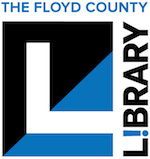April is National Poetry Month, so it’s a great time to try out a novel in verse. If you’ve never read one, it’s just what it sounds like: a novel-length story told complete in poems. Typically the poems are free-verse, but some authors like to mix it up. Novels in verse have been published for teens and children for a number of years, but you don’t often find them written for adults. Don’t miss these great stories just because they are shelved downstairs!
Novels in verse pack a hefty punch into a small package. Authors writing in verse are challenged to boil down a complex story and characters into the few words found in poems. Because there’s a lot of space on every page, you can read even thick novels in verse very quickly, but you may want to slow down to savor the imagery and emotions conveyed by the poems.
Here are some of my favorite novels in verse for you to try:
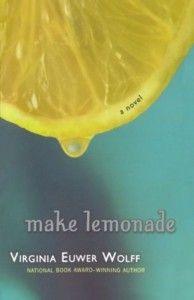
Make Lemonade by Virginia Euwer Wolff (1993; 200 pages). Published in the 90s, this is an early work in the verse novel genre. I read it as a middle schooler and the story has stuck with me ever since. Fourteen-year-old LaVaughn dreams of breaking the cycle of poverty, going to college and getting out of her run-down neighborhood. Her mom has always encouraged her to work hard and to plan for her future. When LaVaughn takes a babysitting job in her neighborhood, she sees what life might look like if she doesn’t escape. Jolly, a seventeen-year-old mother of two is working as hard as she can to provide a life for her children, hiring LaVaughn to help watch them. Is LaVaughn what their little family needs to start making lemonade out of life’s lemons?
This is a powerful story about poverty and families and neighborhoods. Can you make your own destiny? Is it ever too late to try for a better future?
The Crossover by Kwame Alexander (2014; 237 pages; also available on ebook via Overdrive and downloadable audio via Overdrive). I know, I know, I just mentioned this book in a post about basketball books last month, but it’s a special book to me since I was on the 2015 Newbery Committee that gave it its medal. And
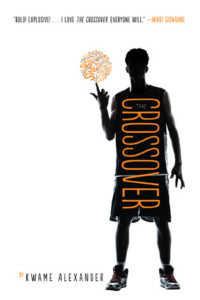
it’s a book that excels in many different categories. Middler-schooler Josh Bell is having a hard time dealing with things at school and with his family, but he deals with his problems by writing. Sometimes poems, sometimes hip hop lyrics, sometimes just lists of rules his father has for life. This book is about basketball, but it’s also about growing up and dealing when things start to change with your friends and your family.
Kwame Alexander uses just a few words to bring his characters to life. Read this book and you will know and love Josh and his twin brother JB. Bonus: a companion novel in verse just came out this month! Rebound (2018, 416 pages) takes the reader back in time to explore the teenhood of Josh and JB’s father Charlie. It’s also great!
A Time to Dance by Padma Venkatraman (2014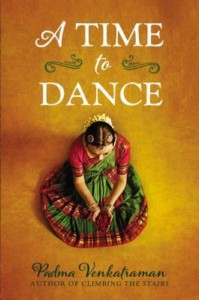 ; 307 pages). Veda lives to dance. It’s all she’s ever wanted to do. And she’s great at it – she’s practiced and performed classical Indian dance since she was little. She knows she’s destined for a career as a dancer. And when Veda loses one of her legs in a car accident, she is determined not to give up on her dreams. But how can a person dance with just one leg? And not just dance but become a star?
; 307 pages). Veda lives to dance. It’s all she’s ever wanted to do. And she’s great at it – she’s practiced and performed classical Indian dance since she was little. She knows she’s destined for a career as a dancer. And when Veda loses one of her legs in a car accident, she is determined not to give up on her dreams. But how can a person dance with just one leg? And not just dance but become a star?
Inspired by true stories, this is a moving book that will move the reader as well. The carefully constructed verse dances on the page just as Veda dances in the book. And as Veda discovers new things about herself, she continues to imagine her future on her terms.
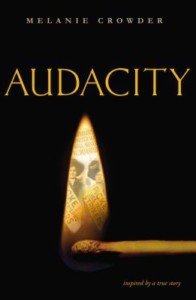
Audacity by Melanie Crowder (2015; 389 pages). Here’s another novel in verse inspired by a true story. Based on the life of labor rights activist Clara Lemlich, this novel in verse illustrates the terrible working conditions in the garment factories of NYC at the turn of the century and the impossible struggle that women faced to improve things. It’s an engrossing story, starting with Clara’s young adult-hood in Russia and the family’s journey to America. Not only did Clara face violence and oppression in the workforce, she faced it at home, too. Her father forbid her to get an education, so Clara went against his wishes to read, learn English, and study, even though her father beat her for it. Crowder does an admirable job of making this a personal story firmly set within a larger historical movement. The reader clearly sees Clara’s personal struggles – she gives up her dream of education and becoming a doctor in order to see her cause through.
For anyone who loves historical fiction or who is interested in women’s history of women’s rights, this is a powerful book to pick up.
— Abby Johnson, Collection Development Leader
